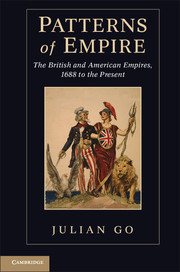Book contents
- Frontmatter
- Contents
- Preface and Acknowledgments
- List of Tables
- List of Figures
- Introduction
- 1 Imperial Paths to Power, 1688–1939
- 2 Colonial Rules
- 3 Hegemonies and Empires
- 4 Imperial Forms, Global Fields
- 5 Weary Titans
- 6 The Dynamics of Imperialism
- 7 Conclusion
- Appendix Notes on Data
- Archives and Abbreviations
- References
- Index
3 - Hegemonies and Empires
Published online by Cambridge University Press: 05 June 2012
- Frontmatter
- Contents
- Preface and Acknowledgments
- List of Tables
- List of Figures
- Introduction
- 1 Imperial Paths to Power, 1688–1939
- 2 Colonial Rules
- 3 Hegemonies and Empires
- 4 Imperial Forms, Global Fields
- 5 Weary Titans
- 6 The Dynamics of Imperialism
- 7 Conclusion
- Appendix Notes on Data
- Archives and Abbreviations
- References
- Index
Summary
Other nations in history have fought in foreign lands and remained to occupy and exploit. Americans, following a battle, want nothing more than to return home.
– George W. Bush, Speech on the USS Abraham Lincoln (2003)In 1940, Adolph Berle, the undersecretary in the U.S. Department State, penned a prescient passage in his diary. “I have been saying to myself and other people, that the only possible effect of this war would be that the United States would emerge with an imperial power greater than the world had ever seen.” It is unclear what Berle meant exactly by “imperial power.” Most likely, he meant it as the founders of the American Revolution had meant it – that is, sovereign strength or greatness. If so, Berle's statement was on the spot. The United States did emerge from World War II as the world's leading economic and military power. In 1950, its GDP was higher than all of Europe's put together and near equal to Europe's and Russia's combined. The United States was the world's leading exporter and foreign investor. Its financial and industrial strength was matched by its agricultural exports. The United States was “the workshop, bakery, and banker of the world.”
- Type
- Chapter
- Information
- Patterns of EmpireThe British and American Empires, 1688 to the Present, pp. 103 - 132Publisher: Cambridge University PressPrint publication year: 2011
- 1
- Cited by



